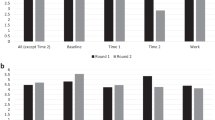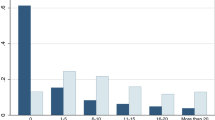Abstract
This paper reports the results of an experiment designed to study how subjects’ decision making may be affected by the timing of participation payments (or show-up fees). The experiment follows Davis et al. (J. Econ. 30:69–95, 2004) where subjects were asked to make a sequential purchase decision and were given the opportunity to purchase information about the value of a good prior to a decision to purchase the good itself. There, subjects purchased information less often than expected which was interpreted as risk-seeking behavior. Here, we test a payment hypothesis by varying the timing of the participation payment. Payment of a show-up fee before the decision-making stages of the experiment increases information purchase, which we interpret as an increase in risk-averse behavior.
Similar content being viewed by others
References
Ackert, L. F., Charupat, N., Church, B. K., & Deaves, R. (2006). An experimental examination of the house money effect in a multi-period setting. Experimental Economics, 9(1), 5–16.
American Institute of Certified Public Accountants. (2002). Welcome to assurance services. http://www.aicpa.org/assurance/index, January 2002.
Arkes, H. K., Joyber, C. A., Pezzo, M. V., Nash, J. G., Siegel-Jacobs, K., & Stone, E. (1994). The psychology of windfall gains. Organizational Behavior and Human Decision Processes, 59, 331–347.
Cherry, T. L., Kroll, S., & Shogren, J. F. (2005). The impact of endowment heterogeneity and origin on public good contributions: evidence from the lab. Journal of Economic Behavior and Organization, 57, 357–365.
Clark, J. (2002). House money effects in public goods experiments. Experimental Economics, 5(3), 223–231.
Davis, L. R., Elliot, S. R., & Joyce, P. (2004). Assurance information: an experimental study. Journal of Economics, 30, 69–95.
Friedman, D., & Sunder, S. (1994). Experimental methods: a primer for economists. Cambridge: Cambridge University Press.
Harrison, G. (2006). House money effects in public goods experiments: comment. Experimental Economics, 10(7), 429–437.
Harrison, G., & Ruström, E. E. (2008). Risk aversion in the laboratory. Research in Experimental Economics, 12, 41–196.
Harrison, G., Lau, M., & Ruström, E. (2007). Estimating risk attitudes in Denmark: a field experiment. Scandinavian Journal of Economics, 109(2), 341–368.
Harrison, G., Lau, M., & Ruström, E. (2009). Risk attitudes, randomization to treatment and self-selection into experiments. Journal of Economic Behavior and Organization, 70, 498–507.
Holt, C. A., & Laury, S. K. (2002). Risk aversion and incentive effects. American Economic Review, 92(5), 1644–1655.
Staw, B. M. (1976). Knee-deep in the big muddy: a study of escalating commitment to a chosen course of action. Organizational Behavior Human Performance, 16, 27–44.
Thaler, R., & Johnson, E. J. (1990). Gambling with the house money and trying to break even: the effect of prior outcomes on risky choice. Management Science, 36(6), 643–660.
Weber, M., & Zuchel, H. (2005). How do prior outcomes affect risk attitude? Comparing escalation of commitment and the house-money effect. Decision Analysis, 2(1), 30–43.
Author information
Authors and Affiliations
Corresponding author
Electronic Supplementary Material
Below is the link to the electronic supplementary material.
Rights and permissions
About this article
Cite this article
Davis, L.R., Joyce, B.P. & Roelofs, M.R. My money or yours: house money payment effects. Exp Econ 13, 189–205 (2010). https://doi.org/10.1007/s10683-010-9235-7
Received:
Accepted:
Published:
Issue Date:
DOI: https://doi.org/10.1007/s10683-010-9235-7




